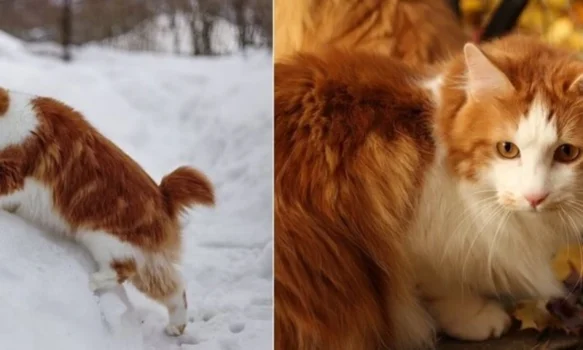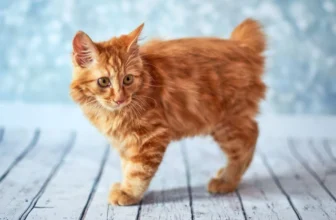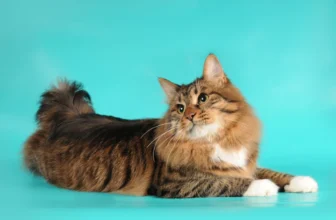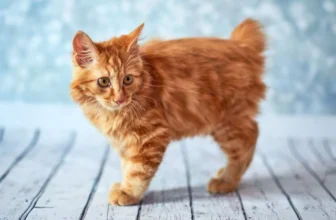The American Bobtail is a unique feline breed that stands out for its muscular, sturdy build. With its short, bobbed tail and powerful body, the Bobtail has become a popular choice among feline lovers who appreciate its distinctive appearance and playful personality. However, understanding the Bobtail’s body shape requires delving into its genetics and physical characteristics, as well as its dietary and exercise needs. In this article, we’ll explore everything you need to know to care for a healthy, muscular American Bobtail, from its nutritional requirements to grooming tips and common health issues. So, let’s dive right in!
Genetics of American Bobtail’s Body Shape
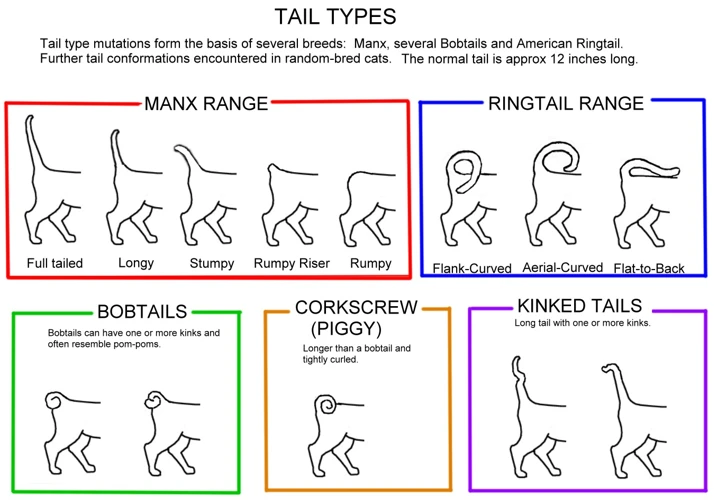
The American Bobtail breed is famous for many features; one of its most striking ones is its muscular and athletic build. But have you ever wondered what causes the American Bobtail to have a body that is so different from other breeds of cats? The reason lies in their genetics, which is unique to this breed. The genes responsible for the Bobtail’s physical characteristics have shaped them into powerful and robust cats that thrive on activity and exercise. To understand how the American Bobtail’s body shape affects their health and what can be done to promote their well-being, read on. You may also be interested to learn about their unique coat patterns in /unique-coat-patterns-american-bobtails/.
Bobtail’s Breeds
The American Bobtail is a breed of cat that is recognized by numerous cat registries worldwide. These cats are known for their unique short and stubby tails, which are the result of a natural genetic mutation. There are a few different variations of the American Bobtail breed, each with their own distinct physical characteristics.
1. Shorthair Bobtail
The Shorthair Bobtail is the most common variety of the American Bobtail breed. These cats have short, dense fur that can come in a variety of colors and patterns. They are known for their broad heads and strong muscular bodies. They also have powerful hind legs that allow them to run, jump, and climb with ease.
2. Longhair Bobtail
The Longhair Bobtail is a variation of the American Bobtail breed that has longer and thicker fur. Like the Shorthair Bobtail, these cats can have a variety of coat colors and patterns. They are known for their gentle and affectionate personalities, as well as their playful and energetic nature.
3. Polydactyl Bobtail
The Polydactyl Bobtail is a variation of the American Bobtail that has more toes than usual. These cats have an extra digit on one or more of their paws, which gives them a unique and playful appearance. They are known for their active and intelligent personalities, as well as their strong hunting instincts.
4. Straight Foot Bobtail
The Straight Foot Bobtail is a variation of the American Bobtail breed that has straight feet instead of the curved feet that are seen in other variations of the breed. These cats are known for their loving and loyal personalities, as well as their strong and muscular bodies.
Despite their differences, all variations of the American Bobtail breed are known for their powerful and muscular builds. These cats require proper nutrition and exercise to maintain their health and wellbeing. By providing them with a balanced diet and plenty of opportunities for play and exercise, owners can help their Bobtails stay happy, healthy, and strong.
If you want more information about American Bobtail’s body structure and health, feel free to check out our article about Body Structure of American Bobtails and Their Health.
Bobtail’s Physical Characteristics
The American Bobtail’s physical characteristics are what make them unique and easily recognizable. They are medium to large-sized cats with a muscular build, a broad chest, and powerful legs that contribute to their agility and strength. Let’s take a closer look at some of their other distinctive features.
Coat: The American Bobtail’s coat is short to medium in length, thick and dense, and comes in a variety of colors and patterns. Typically, their coat is made up of two layers that help to protect them from cold and wet weather.
Tail: The most distinctive characteristic of the American Bobtail is their tail, which is short and often described as “bobbed.” The tail can range from 1 to 4 inches and is either straight, curved, or kinked. This unique feature is the result of a natural genetic mutation.
Head: The American Bobtail’s head is wedge-shaped with high cheekbones and a prominent brow ridge. They have a strong, broad muzzle with a prominent chin, giving them a distinctive look.
Paws: The American Bobtail’s paws are large and round with tufts of fur between their toes, giving them a wild and natural look. Some American Bobtails are born with extra toes on their paws, a genetic trait known as polydactylism.
Eyes: American Bobtails have striking eyes that are usually almond-shaped and come in a variety of colors, including gold, green, blue, and copper. Their eyes are set wide apart, contributing to their alert and curious expression.
The American Bobtail’s unique physical characteristics are what make them a popular breed among cat owners. It’s important to note that while these cats are known for their muscular build, they still require proper nutrition and exercise to maintain their health and strength. For more information on American Bobtails, check out our article on their short tails, powerful legs, and polydactyl paws, as well as their striking eyes here.
Nutrition for a Muscular Bobtail

As a loving pet owner, you want to make sure your American Bobtail maintains a strong and healthy physique. One essential aspect of their well-being is a nutritious diet that supports their muscular build. Finding the right balance of protein, carbohydrates, fats, vitamins, and minerals is crucial to help your Bobtail maintain optimal health. In this section, we will explore how you can provide your muscular Bobtail with a well-rounded and balanced diet to keep them strong and healthy.
Protein
As a muscular breed, the American Bobtail requires a diet high in protein to maintain their strong musculature. When choosing a high-quality cat food for your Bobtail, make sure to look for brands that list meat as the first ingredient. Meat-based protein sources such as chicken, turkey, and beef are preferable to plant-based sources like soy or corn.
To make sure your Bobtail is getting enough protein, check the guaranteed analysis on the cat food label. The minimum recommended protein content for adult cats is 26% on a dry matter basis, but a higher percentage of protein is beneficial for active and muscular cats like the American Bobtail.
In addition to their regular food, you may also consider supplementing your Bobtail’s protein intake with high-quality treats like freeze-dried meats or cooked chicken or fish.
Here is a breakdown of a few protein sources that are good for your Bobtail:
| Protein Source | Protein Content |
|---|---|
| Chicken | Approximately 25% |
| Turkey | Approximately 20% |
| Beef | Approximately 18% |
| Fish | Approximately 25% |
It’s important to note that a diet too high in protein can also cause health problems for your Bobtail. Consult with your veterinarian to determine the appropriate amount of protein for your cat’s individual needs.
Carbohydrates and Fats
The American Bobtail’s muscular build relies heavily on their diet, which should include an appropriate balance of carbohydrates and fats. Carbs are the primary source of energy for the body while fats provide essential nutrients for the maintenance and growth of cells.
Carbohydrates: Whole grains such as brown rice, oats, and quinoa are excellent sources of carbohydrates for Bobtails. These grains provide a slow and steady release of energy, keeping your cat feeling fuller for longer periods. Vegetables such as sweet potatoes, carrots, and green peas are also high in carbs and fiber, making them great additions to their diet.
Fats: Healthy fats are essential to keep your Bobtail’s joints and muscles healthy. Good sources of fat include fish such as salmon and tuna, poultry like chicken, and eggs. Avocado and coconut oil are also excellent sources of healthy fats that can be added to their diet.
Here’s a table summarizing the recommended carbohydrate and fat sources for a Bobtail’s diet:
| Carbohydrates | Fats |
|---|---|
| Whole grains (brown rice, oats, quinoa) | Fish (salmon, tuna) |
| Sweet potatoes, carrots, green peas | Poultry (chicken) |
| Eggs, avocado, coconut oil |
Remember to always consult your veterinarian before making any significant changes to your cat’s diet. They can offer personalized recommendations based on your cat’s individual needs and health status.
Vitamins and Minerals
Maintaining proper nutrition for American Bobtails is crucial for their muscular build, and it’s important to make sure they receive a balanced diet that includes all the necessary vitamins and minerals. Here are some of the essential vitamins and minerals your Bobtail needs to stay healthy:
| Vitamin A: | Keeping your Bobtail’s eyes and skin healthy, vitamin A is found in most high-quality cat foods. However, you can also give your cat foods with high vitamin A content, such as carrots and spinach, as an occasional treat. |
| Vitamin C: | Unlike humans, cats can produce their own vitamin C in their livers. However, giving your Bobtail foods like strawberries, oranges, and broccoli as snacks can help boost their immune system. |
| Vitamin E: | This vitamin helps keep your cat’s skin and coat healthy. While most cat diets have sufficient vitamin E, you can also feed your Bobtail small amounts of foods like sunflower seeds or almonds to increase their intake. |
| Vitamin D: | Essential for bone health, vitamin D can be found in many cat foods. However, your Bobtail can also get this vitamin from going outside in the sun for short periods. |
| Calcium: | Helping to keep bones and teeth strong, calcium is found in most cat foods. However, if your Bobtail is lactose intolerant and can’t consume dairy products, you can get cat-friendly calcium supplements. |
| Phosphorus: | Working in conjunction with calcium, phosphorus also helps maintain strong bones and teeth. Your Bobtail can get sufficient amounts of phosphorus from high-quality cat food that incorporates animal proteins like chicken and turkey. |
| Taurine: | Essential for cardiovascular health, taurine is found mostly in animal-based proteins. Make sure to feed your Bobtail protein-rich foods like chicken and turkey, as well as giving them high-quality cat food. |
Providing your Bobtail with a well-rounded diet that incorporates all of these essential vitamins and minerals is key to keeping them healthy and strong. You can also supplement their diet with occasional healthy snacks to give them an extra boost of important nutrients. Always make sure to consult with your veterinarian about any dietary changes or concerns you may have about your Bobtail’s nutrition.
Exercise for a Healthy Bobtail
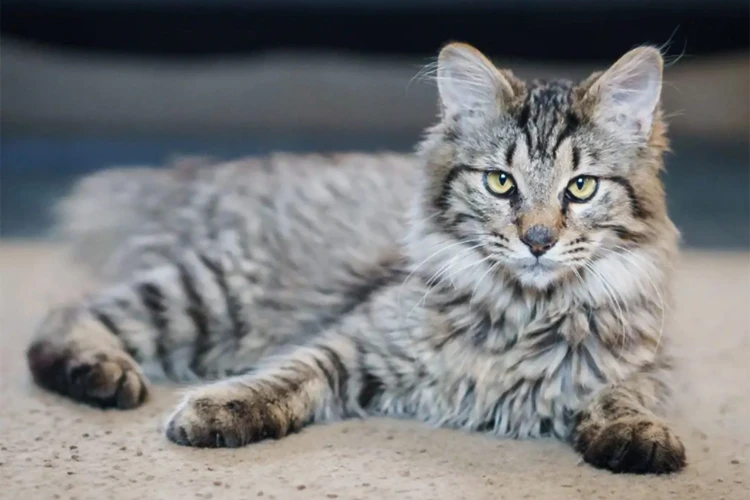
Ensuring your American Bobtail gets enough exercise is key to maintaining their muscular build and overall health. Physical activity plays a significant role in keeping them fit and healthy. Bobtails are known for their playful and active nature, making it easy to incorporate exercise into their daily routine. In this section, we will explore different ways to keep your Bobtail active and healthy.
Physical Activities
One of the most important things to keep in mind when it comes to maintaining a healthy and muscular American Bobtail is regular exercise. These cats are highly active and love to play, so it’s important to provide them with plenty of opportunities to burn off excess energy and stimulate their minds.
Some popular physical activities for Bobtails include:
| Activity | Description |
|---|---|
| Running | Bobtails love to run, so providing them with ample space to sprint around is crucial. Cat trees, shelves and other elevated surfaces also give them the chance to jump up and down, which is important for building strong leg muscles. |
| Chasing Toys | Bobtails have a strong prey drive and love to run after toys that mimic the movements of animals. Consider investing in toys like feather wands or mouse-shaped toys that can be dragged across the floor for your Bobtail to pursue. |
| Climbing | As natural climbers, Bobtails love to scale heights and leap from one surface to another. Providing them with a cat tree or other climbing apparatus can help them work on building their upper body strength. |
| Hide and Seek | Playing games that challenge your Bobtail’s agility and cognitive abilities can be highly rewarding for both you and your cat. Try hiding treats or toys around the house and encouraging your Bobtail to find them. |
It’s important to remember that Bobtails are active cats, which means they require more exercise than your average house cat. Ensuring that they get plenty of opportunities for physical activity will not only help them build and maintain their muscles, but it can also help prevent obesity and other health problems down the line.
Play Time
Playing is an important part of a healthy American Bobtail’s life. Playtime provides them with physical and mental stimulation and helps to maintain their overall well-being. As an owner, it is crucial to provide your Bobtail with enough playtime throughout the day. Here are some ideas to keep your Bobtail entertained during playtime:
- Interactive Toys: Toys such as wand toys with feathers or strings can give your Bobtail a chance to practice their hunting instincts. These toys keep your Bobtail on their feet, allowing them to run, jump and pounce, which helps to keep their muscles strong and toned.
- Puzzle Toys: Puzzle toys are a great way to keep your Bobtail engaged for longer periods. Toys that dispense treats such as puzzles or mazes help to promote healthy eating habits and prevent overeating. Putting treats inside the puzzle toys can entice your Bobtail to play with them for hours.
- Climbing: Climbing is a natural exercise for Bobtails. Providing your Bobtail with a cat tower will serve as a great exercise tool. Cat towers have several levels, each with their own challenge. Your Bobtail can climb and jump from level to level, engaging multiple muscle groups as they do so.
- Fetch: Believe it or not, Bobtails are capable of learning how to play fetch. Tossing a toy or ball and bringing it back gives a great workout to your Bobtail’s legs, back, and neck muscles.
Playtime is critical in keeping your Bobtail happy, healthy, and fit. Always ensure that playtime follows some basic rules to avoid any injuries or accidental harm to your pet. Allow them to set the pace and amount of playtime as every Bobtail is different, but at the same time keep them engaged in physical activity. Providing your Bobtail with a healthy and active lifestyle will ensure their muscular build stays strong and toned for years to come.
Toys and Games
A playful nature is natural to the American Bobtail breed, making toys and games an essential part of keeping them active and entertained. Providing your Bobtail with a variety of toys and games can help promote their physical and mental well-being.
Here are some toy suggestions for your muscular Bobtail:
| Toy Type | Description |
|---|---|
| Interactive Toys | These toys are designed to keep your Bobtail entertained and mentally stimulated. Puzzle feeders or treat dispensers can provide hours of entertainment and exercise for your Bobtail. |
| Balls and Chasing Toys | These types of toys promote your Bobtail’s natural hunting instincts. Tennis balls or small plush toys can keep your Bobtail entertained and active. |
| Climbing Toys | Bobtails love to climb and explore their surroundings. Cat trees or climbing towers can provide them with a safe and secure place to climb and play. |
| Scratching Toys | Keeping your Bobtail’s claws healthy is essential. Scratching posts or mats not only provide your Bobtail with a place to scratch, but they also help to prevent them from damaging your furniture. |
In addition to providing a variety of toys, games can also help to keep your Bobtail active and mentally stimulated. Playing hide-and-seek or tag with your Bobtail can be a fun and easy way to keep them entertained. Laser pointers and feather wands can also provide your Bobtail with endless entertainment.
Remember to always supervise your Bobtail when they are playing with toys or engaging in games. This will ensure their safety and prevent any accidents from occurring. Providing toys and games for your muscular Bobtail is a great way to promote their physical and mental well-being.
Common Health Issues Affecting Muscular Bobtails
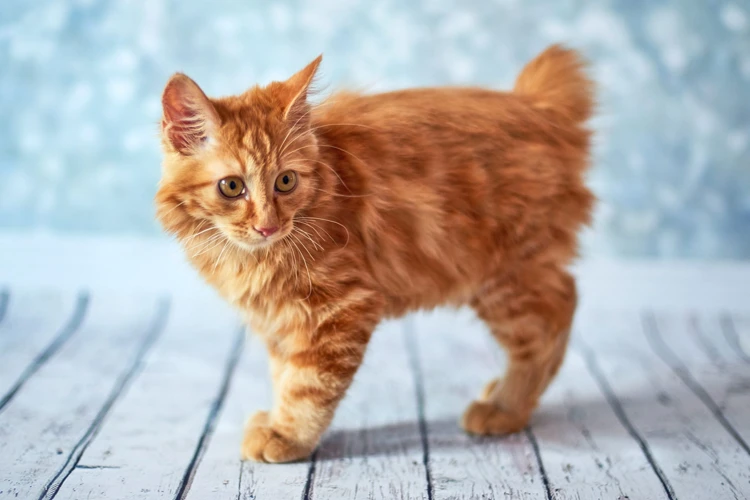
As much as we love our furry friends, it’s important to recognize that Bobtails, like all other cats, are prone to certain health issues. These health problems can affect their overall well-being, and may even impact their muscular build. In this section of the article, we will discuss some of the most common health issues that affect our beloved Bobtails. By knowing what to look out for and how to address these concerns, we can help ensure that our feline companions stay happy and healthy for years to come. So let’s dive into the world of Bobtail health!
Spinal Problems
Spinal problems are a common issue in muscular American Bobtails, as they are typically more active than their thinner counterparts. Some common spinal problems in this breed include lumbar and sacral spinal issues, tail bone fractures, and intervertebral disc disease (IVDD).
Lumbar and Sacral Spinal Issues: The lumbar and sacral spine are located in the lower back, and issues in this area can lead to discomfort or even paralysis. Symptoms of lumbar and sacral spinal issues include difficulty walking, dragging the hind legs, and sensitivity around the lower back area. Treatment options for these types of spinal issues typically include rest, medication, and in severe cases, surgery.
Tail Bone Fractures: American Bobtails are known for their short tails, which can actually make them more susceptible to tail bone fractures. This type of injury can occur due to trauma, such as being accidentally stepped on, and can cause severe pain and discomfort. Treatment for tail bone fractures typically includes rest and medication, and in severe cases, surgery may be required.
Intervertebral Disc Disease (IVDD): IVDD is a spinal issue that occurs when the cushioning discs between the vertebrae in the spine start to degenerate or herniate. Symptoms of IVDD in American Bobtails include loss of mobility in the hind legs, sensitivity around the spine, and difficulty walking or even standing. Treatment options for this issue may include medication, laser therapy, and in severe cases, surgery.
It’s important for American Bobtail owners to keep an eye out for any signs of spinal problems in their cats and to seek veterinary care immediately if they suspect an issue. Proactive measures like regular exercise and maintaining a healthy weight can also help prevent spinal problems in this breed.
Joint Issues
Joint issues are a common problem faced by many muscular American Bobtails. These can range from minor discomfort to seriously debilitating conditions if left untreated. In order to prevent and treat joint problems, it’s important for pet owners to keep their Bobtails active and healthy. One way to do this is through regular exercise, as well as providing them with proper nutrition.
There are several joint issues that may affect your Bobtail, including hip dysplasia, arthritis, and luxating patella, which occurs when the kneecap slips out of place. Some of the signs of joint problems may include stiffness, limping, and difficulty standing up or jumping. It’s important to take your Bobtail to a veterinarian if you notice any of these symptoms.
Preventative Measures: One of the best ways to prevent joint issues in your Bobtail is by keeping them at a healthy weight. This can be achieved through proper nutrition and exercise. Additionally, providing your Bobtail with supplements such as glucosamine and chondroitin can help to maintain healthy joints.
Treatment: If your Bobtail does develop joint issues, there are several treatment options available. This may include medication, physical therapy, and surgery in severe cases. The type of treatment will depend on the severity of the issue and the advice of your veterinarian.
| Joint Issue | Symptoms | Treatment | Preventative Measures |
| Hip Dysplasia | Limping, difficulty standing up or jumping | Medication, physical therapy, surgery | Proper nutrition, exercise, weight management |
| Arthritis | Stiffness, limping, loss of mobility | Medication, supplements, physical therapy | Proper nutrition, exercise, weight management |
| Luxating Patella | Limping, difficulty standing up or jumping, kneecap slipping out of place | Medication, surgery | Proper nutrition, exercise, weight management |
Preventing and treating joint issues in your American Bobtail requires a combination of proper nutrition, exercise, and regular check-ups with your veterinarian. By taking a proactive approach to your Bobtail’s health, you can help ensure they live a long, active, and comfortable life.
Obesity
Maintaining an appropriate weight is important for the health of the American Bobtail. As a muscular breed, Bobtails require a balanced diet and plenty of exercise to prevent obesity. Obesity is a common health issue that affects many cats, and it can lead to a variety of other health problems that can endanger the wellbeing and quality of life of your pet. According to the Association for Pet Obesity Prevention, over 50% of cats in the United States are overweight or obese.
Risks of Obesity: Obesity can lead to a variety of health problems that can compromise the overall health of your cat. Some common health issues associated with obesity in cats include diabetes, heart disease, arthritis, and urinary tract problems.
Causes of Obesity: The most common causes of obesity in cats are overfeeding and a lack of physical activity. Feeding your cat too much food, or feeding them high-calorie foods can lead to weight gain. A lifestyle that lacks physical activity can make it difficult for Bobtails to burn off excess calories.
Prevention of Obesity: A balanced diet and regular exercise can help prevent obesity in the American Bobtail. Feeding your cat a high-quality cat food that is appropriate for their age and activity level is an important step in keeping your cat at a healthy weight. Providing your cat with opportunities for play and exercise, such as interactive toys or playtime in a cat tree, can help them burn off excess calories and maintain a healthy weight.
In the table below, you can find some tips that can help you prevent obesity in your American Bobtail:
| Tip | Description |
|---|---|
| Feeding a Balanced Diet | Choose a high-quality cat food that is appropriate for your cat’s age and activity level. Measure your cat’s food carefully to ensure that they are not overfed. |
| Limit Treats | Avoid giving your cat too many treats, or feeding them treats that are high in calories. Instead, use low-calorie treats or try feeding them small pieces of cooked chicken or fish. |
| Provide Regular Exercise | Provide your cat with opportunities for play and exercise. Interactive toys, laser pointers, or a playtime in a cat tree is a great way for them to burn off calories. |
By following these tips and taking care of your American Bobtail’s diet and exercise needs, you can help ensure that your cat stays healthy and free from obesity-related health problems.
Grooming Tips for Bobtails
Taking care of your beloved American Bobtail includes proper grooming that will keep your furry pal looking and feeling their best. Maintaining your pet’s fur, nails, and mouth hygiene is essential for their physical and emotional well-being. Grooming your Bobtail can also be a relaxing way to bond with your pet, strengthening the emotional connection between you both. In this section, we will discuss the best grooming tips and techniques to ensure that your American Bobtail always looks and feels their best. Get ready to learn about proper bathing and brushing, nail trimming, mouth care, and preventing hairballs!
Bathing and Brushing
Keeping an American Bobtail’s coat in top condition requires regular bathing and brushing. The frequency of bathing depends on the activities of the cat, but generally once every three to four months is sufficient. However, if your Bobtail enjoys playing outdoors or rolls in dirt frequently, it may require more frequent bathing.
When bathing your Bobtail, make sure to use a cat-specific shampoo and lukewarm water. Hot water can irritate your cat’s skin, while cold water can be uncomfortable for them. Before shampooing, make sure to rinse your cat’s coat to remove any loose dirt or debris.
Once the shampoo is applied, gently massage it into your cat’s coat, avoiding the eyes and mouth. Rinse the shampoo thoroughly, making sure to remove all the suds. It is important to dry your Bobtail thoroughly after the bath. Use a clean towel and gentle pressure to remove any excess water from their coat.
Brushing your Bobtail’s coat regularly with a slicker brush or a comb can help to remove any tangles or mats. Brushing also distribute the natural oils throughout the coat and remove loose fur. Focus on the areas where tangles are more likely to occur, such as behind the ears, under the arms, and around the tail.
Regular brushing can also help you detect any skin problems, such as sores or rashes. If you find any, make sure to seek veterinary care.
Here is a table summarizing some important bathing and brushing tips:
| Bathing | Brushing |
|---|---|
| Use a cat-specific shampoo | Brush regularly with a slicker brush or comb |
| Use lukewarm water | Focus on areas prone to tangles and matting |
| Rinse thoroughly to remove all residual shampoo | Detect skin problems, such as sores or rashes |
| Dry the coat thoroughly after the bath | Remove loose fur and distribute natural oils throughout the coat |
Remember, keeping your American Bobtail clean and well-groomed not only keeps them looking great but also ensures they stay healthy and comfortable.
Nail Trimming
Keeping your American Bobtail’s nails trimmed is an important part of their overall grooming routine. This task can be done at home or by a professional groomer. Here are some tips for nail trimming:
- Prepare: Before starting, make sure you have a pair of high-quality nail clippers specifically designed for cats. You might also want to have some styptic powder or cornstarch on hand to stop any bleeding that may occur if you accidentally cut too far down the nail.
- Get your cat comfortable: Choose a quiet area in your home where your Bobtail feels relaxed. Place your cat on a non-slip surface, like a towel or rubber mat, to prevent them from slipping or sliding while you trim their nails.
- Trim the nails: Hold onto your cat’s paw and gently press on one of the toe pads to extend the nail. Carefully trim just the tip of the nail, making sure not to cut into the quick, which is the pink part inside the nail that contains blood vessels and nerves. Repeat this process for each nail, and don’t forget to trim the dewclaws if your Bobtail has them.
- Take breaks: If your cat becomes anxious or restless during the process, take a break and try again later. Avoid restraining your cat too tightly, which can further increase their anxiety.
- Reward your cat: After trimming their nails, reward your Bobtail with treats and praise for their good behavior. This positive reinforcement can help them associate nail trimming with positive experiences.
Regular nail trimming can prevent your Bobtail from developing painful ingrown nails or experiencing discomfort while walking. If you are unsure about how to trim your cat’s nails, consult with a veterinarian or professional groomer for guidance.
Mouth Care
Taking care of your American Bobtail’s mouth is an essential part of their overall health. Neglecting their oral hygiene can lead to problems such as bad breath, tooth decay, and gingivitis. Here are some tips for ensuring your Bobtail’s mouth stays healthy:
- Regular Brushing: Just like humans, cats need their teeth brushed regularly to remove plaque and prevent tartar buildup. Begin by introducing your Bobtail to brushing with a soft-bristled brush and tasty toothpaste made for cats.
- Dental Treats: In addition to brushing, dental treats can also help keep your Bobtail’s teeth clean. Look for treats that are specifically designed to clean teeth and freshen breath.
- Professional Cleanings: Sometimes even with regular brushing and treats, your Bobtail’s teeth may need a professional cleaning from a veterinarian. This procedure will remove any buildup that cannot be reached through at-home care.
- Watch for Signs of Mouth Problems: Keep an eye on your Bobtail’s mouth and watch for any signs of problems such as bad breath, swollen or bleeding gums, or loose teeth. If you notice any of these issues, bring your cat to the vet as soon as possible.
By following these simple mouth care tips, you can help ensure that your American Bobtail maintains a healthy and happy life. Remember, good oral hygiene is not only essential for their overall health, but it can also lead to a longer and more joyful life with your furry friend.
Preventing Hairballs
Like many other cat breeds, American Bobtails also suffer from hairballs. When grooming, cats swallow loose fur, which accumulates in their stomach over time, forming hairballs that can cause digestive issues. Thankfully, there are measures you can take to prevent hairballs from forming in your bobtail.
Frequent Grooming: One of the simplest measures you can take to prevent hairballs in your American Bobtail is by grooming them regularly. Regular combing and brushing will help eliminate loose fur before your cat ingests it.
Dietary Changes: Switching your cat to a specialized diet can also help prevent hairballs. A diet high in fiber will help with digestion and reduce hairball formation. There are plenty of hairball control formulas available on the market that contain high levels of dietary fiber.
Lubricants: Cats naturally produce lubricants that help in the passage of hairballs. However, sometimes, these lubricants are absent, and hairballs cannot pass through the digestive tract easily. You can add a cat-specific lubricant to your cat’s food, which helps in the digestion of hairballs.
Hydration: Encouraging your cat to drink more water can help reduce hairball formation. Water helps keep the digestive tract hydrated, making it easier to pass hairballs, and it helps in digestion.
Remember, prevention is better than cure. By following these simple steps and taking the necessary precautions, you can significantly reduce your American Bobtail’s risk of suffering from hairballs.
| Preventive Measures | Benefits |
|---|---|
| Frequent Grooming | Eliminates loose fur before ingestion |
| Dietary Changes | Reduces hairball formation through digestion aid |
| Lubricants | Helps in the digestion of hairballs |
| Hydration | Keeps digestive tract hydrated, making it easier to pass hairballs |
Conclusion
After learning about the American Bobtail’s muscular build, it’s clear that genetics plays a significant role in their body shape. However, proper nutrition and exercise are also essential to ensure that your Bobtail stays healthy and strong. A diet high in protein, healthy carbs, and essential vitamins and minerals are crucial for maintaining their muscular physique.
Regular physical activity is also essential for your Bobtail’s health. Providing them with plenty of opportunities for playtime and exercise is crucial for their physical and mental wellbeing. Bobtails are highly active cats that enjoy engaging in physical activities, and providing them with toys and games can be an excellent form of exercise.
It’s crucial to stay on top of your Bobtail’s grooming needs to maintain their health and appearance. Regular brushing and bathing will help keep their coat healthy and shiny, and proper nail trimmings will prevent scratches and potential infections. Don’t forget to pay attention to their mouth care and prevent hairballs by providing them with appropriate grooming tools.
While Bobtails are generally healthy cats, there are some common health issues associated with their breed, such as spinal problems and joint issues. Therefore, it’s essential to monitor your Bobtail’s health and seek veterinary care if needed.
Overall, the American Bobtail is a beautiful and unique cat breed that requires proper care to maintain their health and muscular build. By providing them with proper nutrition, exercise, and grooming, you can ensure that your Bobtail lives a long and healthy life.
Frequently Asked Questions
What makes the American Bobtail’s muscular build unique?
The American Bobtail’s muscular build is unique because it is naturally occurring rather than being the result of selective breeding.
What factors determine the muscularity of a Bobtail?
The muscularity of a Bobtail is determined by genetics, nutrition, and exercise.
What do Bobtail breeds have in common?
Bobtail breeds have in common a shortened tail, muscular build, and strong hunting instincts.
What are the physical characteristics of a Bobtail?
Physical characteristics of a Bobtail include a muscular build, short tail, broad head, and sturdy legs.
How much protein should be in a Bobtail’s diet?
A Bobtail’s diet should contain a minimum of 26% protein to maintain muscle mass and support growth.
What types of physical activities are best for a Bobtail?
A Bobtail benefits most from physical activities such as hiking, running, and interactive playtime with their owner.
What are some common joint issues in muscular Bobtails?
Common joint issues in muscular Bobtails include hip dysplasia and osteoarthritis.
How often should a Bobtail be groomed?
A Bobtail should be groomed at least once a week to maintain a healthy coat and prevent matting.
How often should a Bobtail’s nails be trimmed?
A Bobtail’s nails should be trimmed every 4-6 weeks to prevent overgrowth and injury.
What can be done to prevent hairballs in Bobtails?
To prevent hairballs, Bobtails should be brushed regularly and given a hairball prevention formula cat food.

